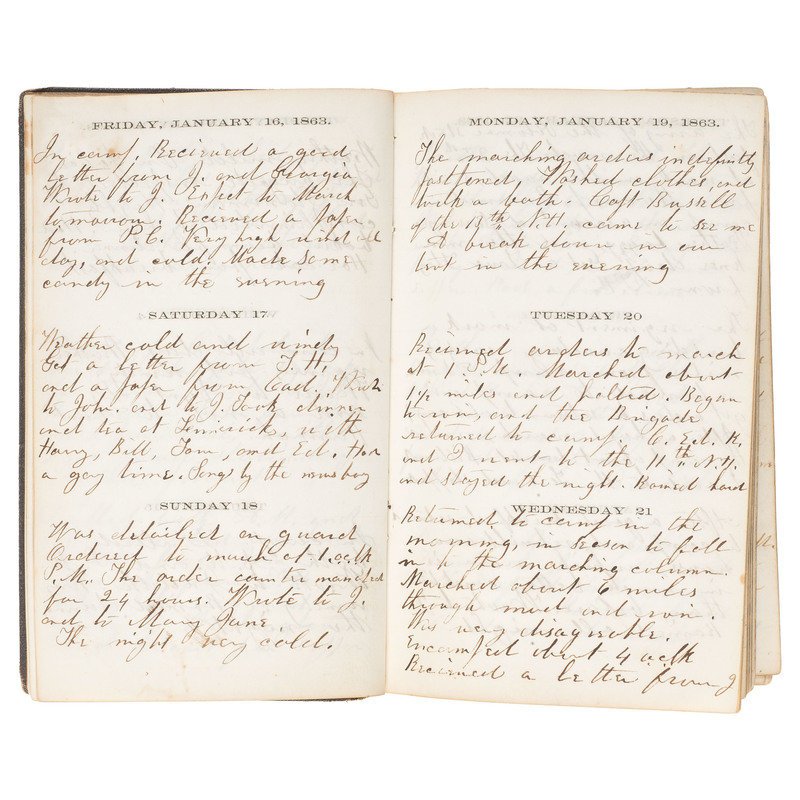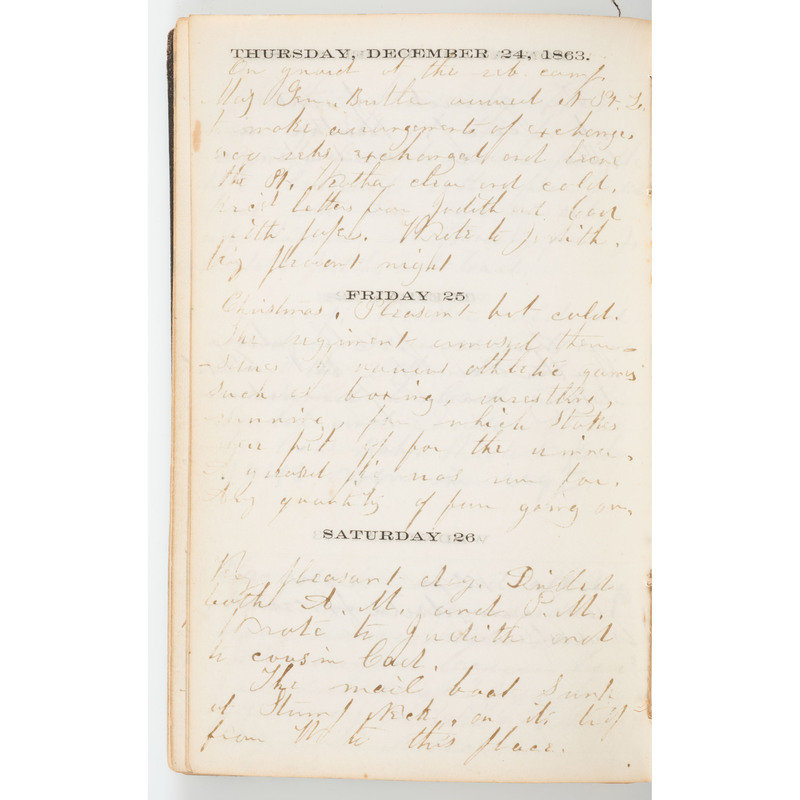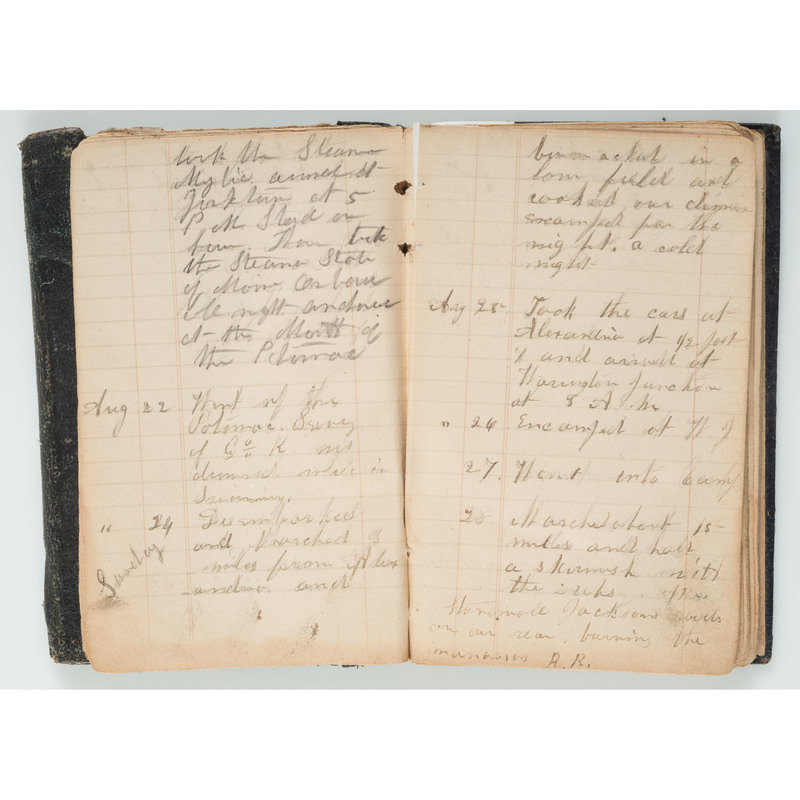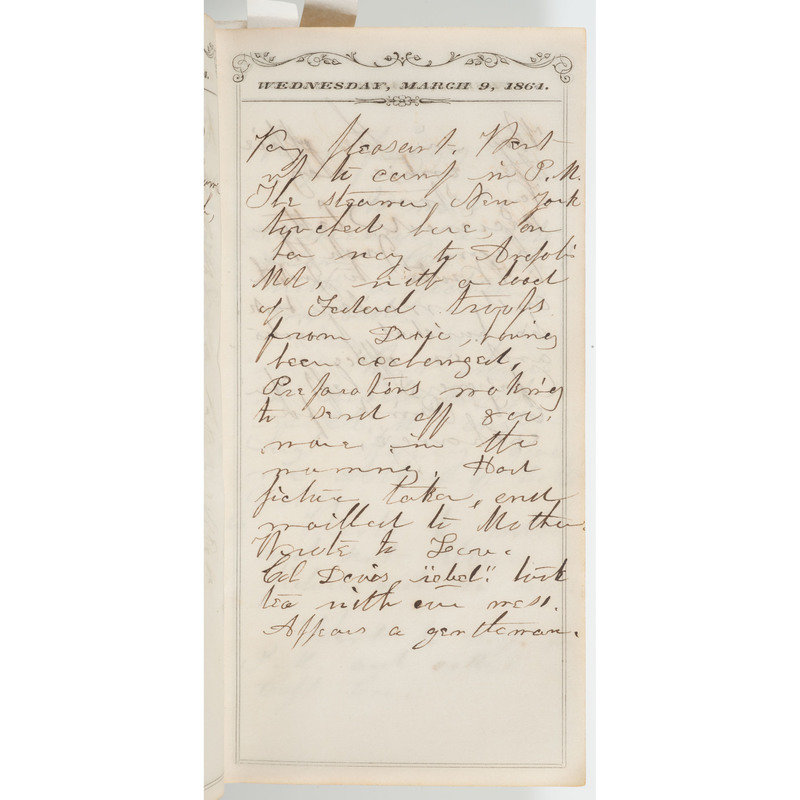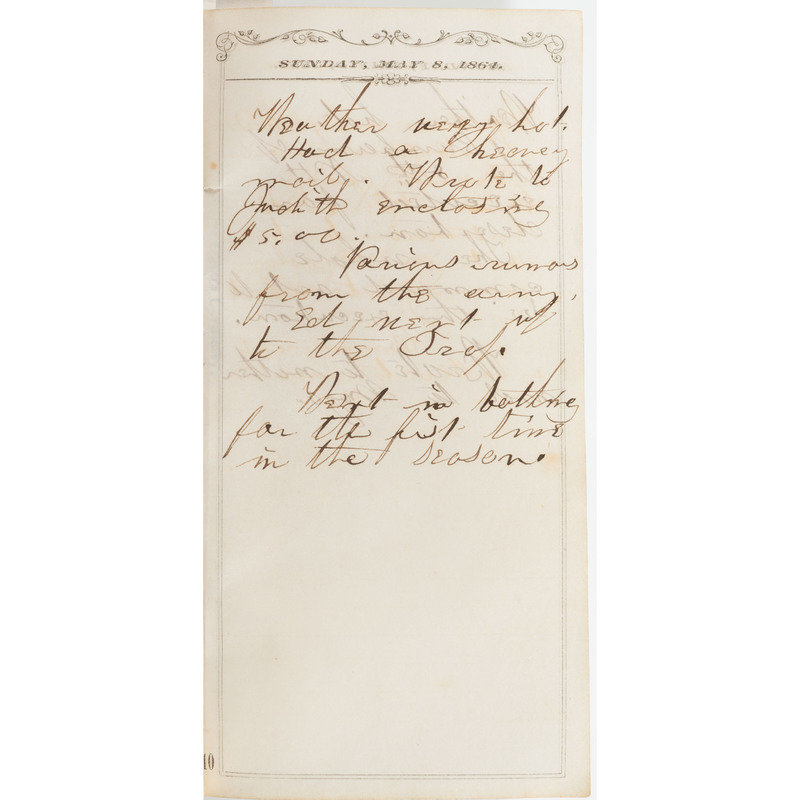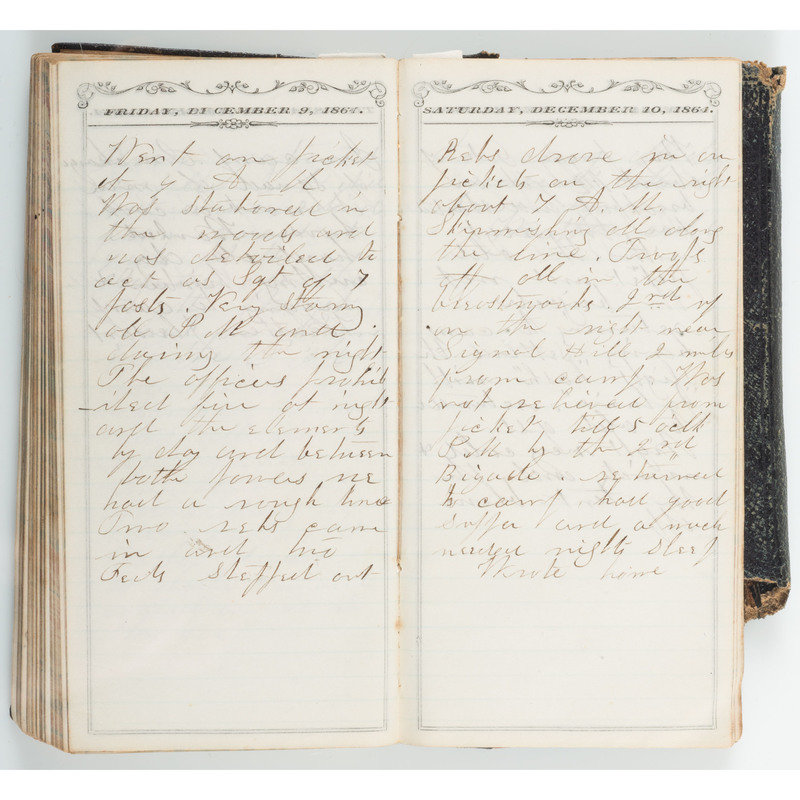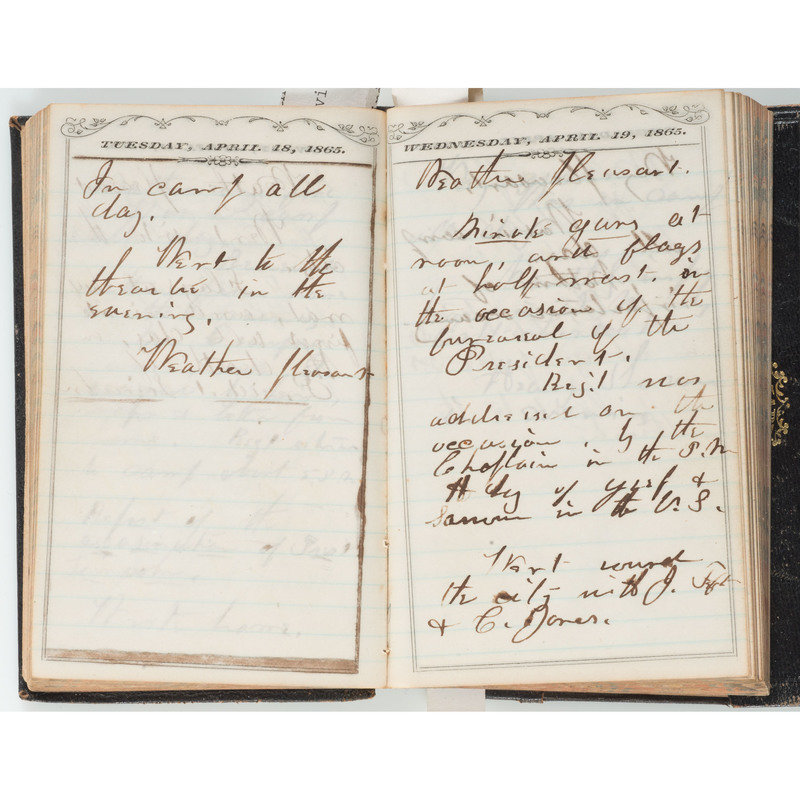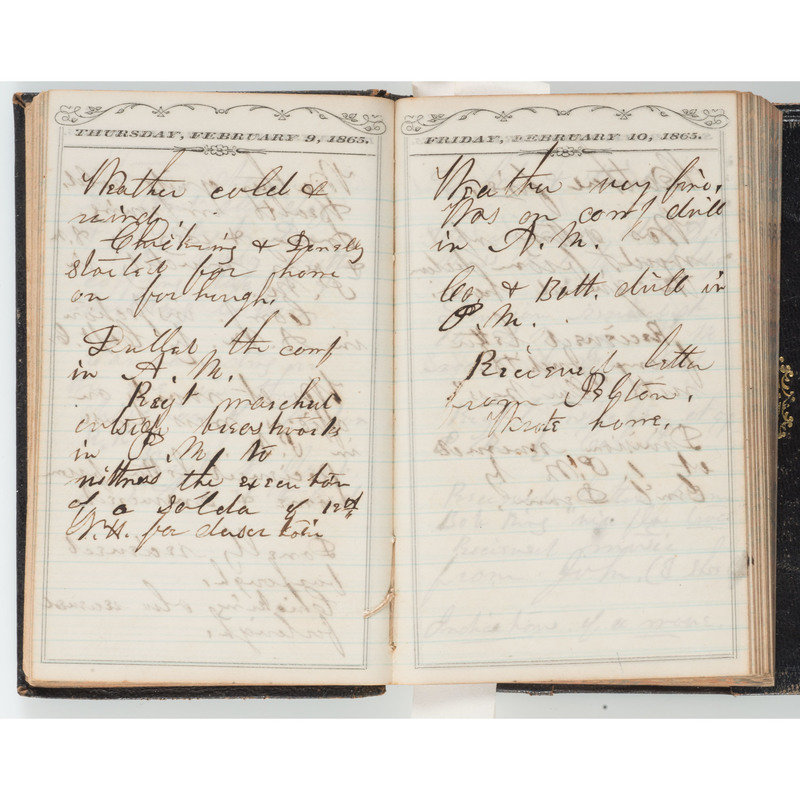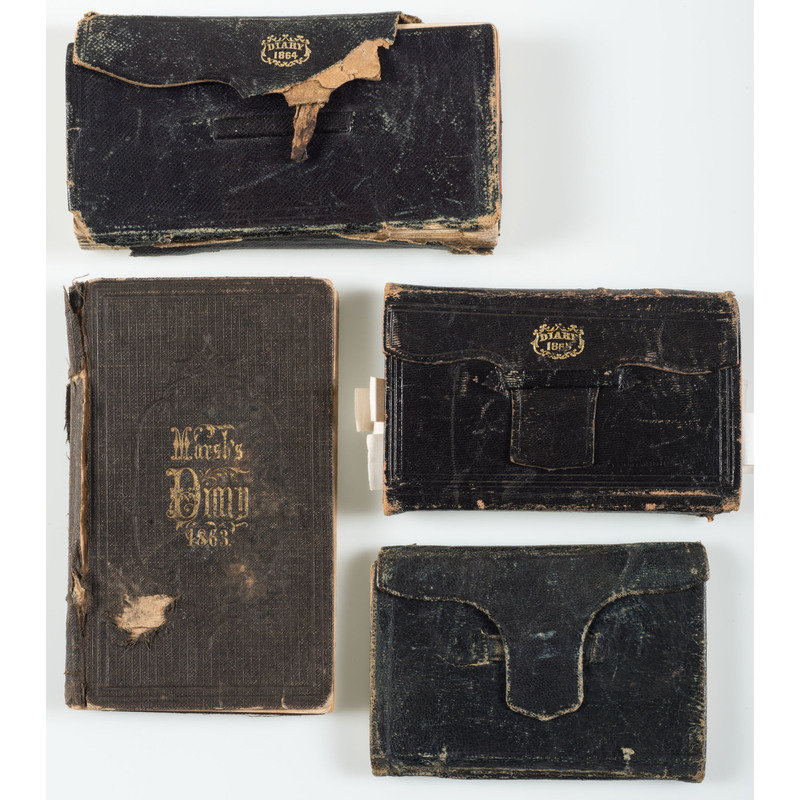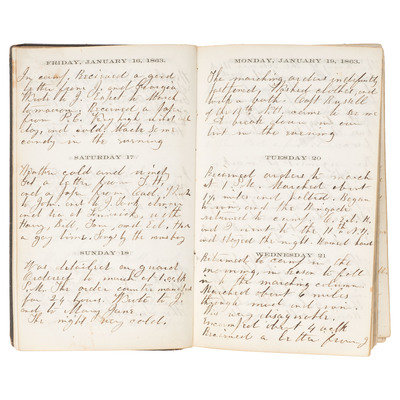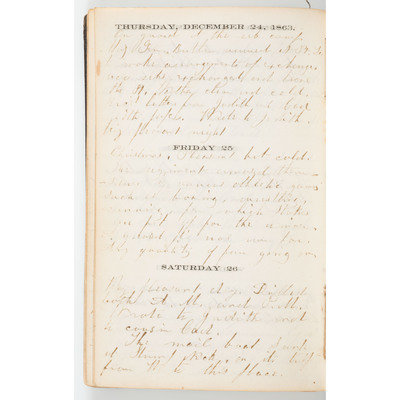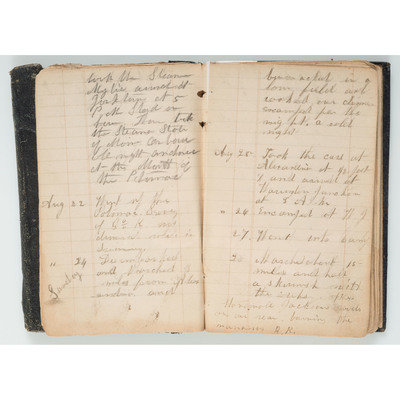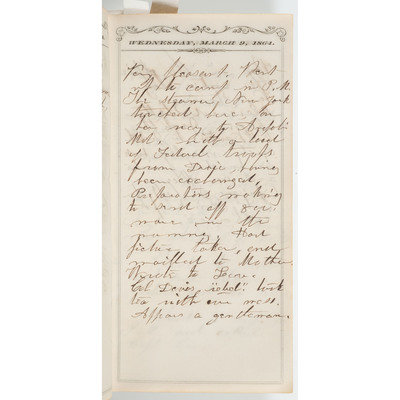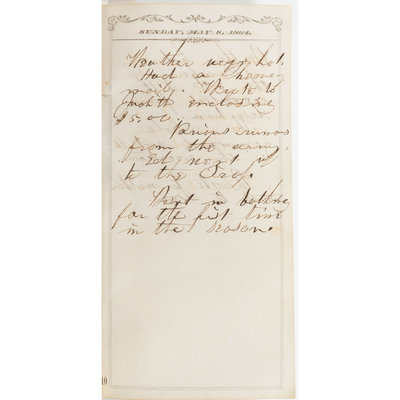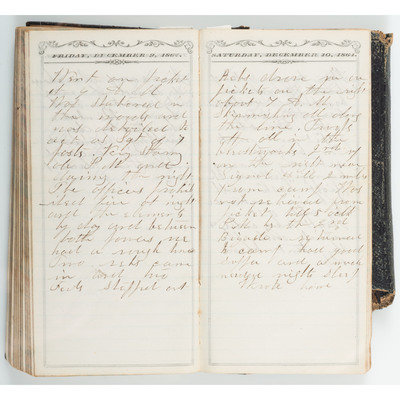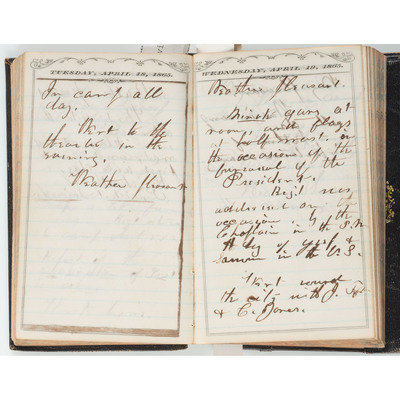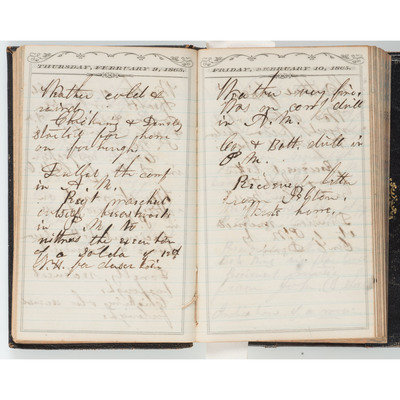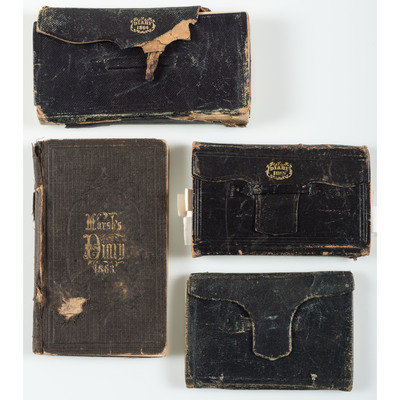Condition Report
Contact Information
Lot 79
Lot Description
Lot of 4 diaries covering Private Jared P. Hubbard's nearly three years of Civil War service.
Hubbard (1835-1903) enlisted in the 2nd New Hampshire Volunteer Infantry as a 27-year-old private in August 1862. A resident of Somersworth (Great Falls), NH, he had married Judith Junkins on January 11, 1860 and they had a young daughter, Annie L. (b. 1861). Judith was there to greet him when the unit was mustered out in June 1865, but she does not appear in the 1870 census. Hubbard remarried in February 1877 and remained in Great Falls, where he seems to have gone to work in a cotton mill.
The first diary begins with Hubbard's enlistment on August 8, 1862. The two diaries from 1863 and 1864 are mostly filled in (with a few exceptions, such as a nearly month-long furlough in 1863 and several periods of illness in 1864 that also lead to him returning home for a short time to recover). The 1865 diary is completed through mid-June, as they were mustered out on the 9th, but had to hang around for a while to get their pay and travel vouchers, etc.
Hubbard's experiences in 1862 were recorded in a small leather notebook with flap closure, 3 x 4.5 in. After enlistment, the 2nd NH headed south on a boat. From the beginning, life was eventful. Two men went overboard, one jumped, the other fell (August 15). On September 2, "...Gen. Kearny killed at Chantilly." All this in less than a month since enlisting!
November 14: "A party of 9 of us went to Bull Run. Found two of our Company unburied. Buried them. Went over the whole field...The regiment ordered to pack knapsacks and be ready to march at a moments notice." He could not know it then, but they were headed to Fredericksburg.
December 11: “Got up at ½ past and about 5 while eating my breakfast the first gun was fired. In about ½ hour the battle commenced hot and heavy. Fell into line about 6. Ordered to leave our knapsacks in camp. Marched about ½ mile, and the brigade formed in some low pine woods and rested. The cannonading was very heavy until about noon. The N.Y. 34 was 1st to cross and lost 40 men. About noon the firing nearly ceased; at about 4 P.M. it again commenced with increased violence and the cannonading ceased and musketry continued till dark. The result of the days fighting was the crossing of the river and the ???? of F. by the Rebels with quite a loss in our side. Our regiment encamped for the night when we remained all day: Took another day ???."
December 12: "Marched at about 7 ½ oclk. All ??? halted in front of F. had a great chance to see the city. Very Smokey. But little Artillery firing during the forenoon. The 6th, 9th, 11th, 12th N.H. Vols. next ahead of us. Saw many of the Gt. Falls boys. Remained near the R.R. station till about 3 P.M. the Rebs then opened a long line of batteries in the rear of the city, showing that they had not skedaddled. It not being thought frequent for us to cross it the city, we about face, and went down the ??? and encamped in the woods near the place where Gen. Franklin crossed, and expect to cross in the morning. Went to sleep and at 10 oclk was awakened by orders to cross at 11 oclk. Our regiment and the 11th had crossed the R. on the pontoon bridge. A very cold night."
December 13: "the Cannonading opened again in the morning with brisk and kept it up all day. Another pontoon bridge was thrown across making 3 at this place. Was detailed for guard on one of them . The cannonading was heavy and fearful all day. Took many prisoners talked with some and they all said they were glad they was taken exchanged letters(?) the wounded came min one stream all the afternoon. Went on guard at the upper bridge to prevent stragglers from crossing. Turned in at 8 and at 10 & 12 our Regt was ordered up to the front was about 1 & ½ miles and bivouacked for the night with the 1st & 16th in front a very muddy field."
December 14: "This morning at daylight the pickets commenced firing and on batteries opened and this did in reply one of which was very troublesome to us and 20 of our company was ordered to go down and silence it. The 1st platoon went and by a few volleys effectively silenced it. We remained in the ditch beside of the road And skirmishers held with the rebs. Fired my 55 rounds at no one we were relieved by the 2nd platoon. No general engagement and quick with the exception of a little skirmishing at about sun set both parties sent out flags of truce and a party from our Co. went to the front and ?? salutations with the enemy. Showed one of them H. Weekly found them a fine set of fellows. Shook hands at parting. Cessations of hostilities for one hour. Was on watch 2 hours in the night. Slept the rest of the night, which was quite warm. 4 of the Co. wounded…"
December 15: "Rousted at 5 A.M. and the regiment was rel??? at about 8 ½ AM and went to the rear of the brigade a distance of about 800 yds and took our position on the turnpike under a high bank which makes a fine protection from the ensuing fire laid in the road? Till night. Not much firing during the day. At about 5 PM ordered to the extreme front again to support the ac????? Pickett not on the 1st relief camp watch. Turned in at 8 and 10 was awoke and we were evacuated that side of the river and about 2 AM encamped in the woods about 2 miles from our ???? rained during the night."
December 16: "A little artillery firing on the night. At about 10 AM ordered to march and after a march of 5 miles reached our former camp fixed up an old tent…"
Fortunately for them, the remainder of the year was pretty quiet.
Entries for 1863 are included in Marsh's Octavo Diary, or Daily Remembrancer. Boston: H.F. Marsh. 3.5 x 6 in., in brown cloth (leatherette). January is slow. Hubbard is detailed to the woods to chop wood. Most of the news consists of rumors: "...heard of the sinking of the Monitor off Cape Hatteras" (January 5); "...heard of the great victory of Murfreesboro" (January 7).
The 2nd NH spent the next week or so building their winter quarters - tents or cabins, chimneys, bunks, etc. They then received orders to march - the run-up to Burnside's infamous "Mud March."
January 20: "Received orders to march at 1 PM. Marched about 1 ½ miles and halted. Began to rain and the Brigade returned to camp…."
January 21: "Returned to camp in the morning in season to fall in to the marching column. Marched about 6 miles through mud and rain. Was very disagreeable. Encamped about 4 oclk. …"
January 22: "The army of the Potomac stuck fast in the mud. [emphasis added]The 2nd at work on the road, 5 miles from the camp. Remained in camp, on account of sore eyes. Rather foggy and the mud knee deep…."
January 23: "The regiment at work on building cavelary[sic] road 4 miles from camp. At noon returned to camp and got orders to return to old camp. After a hard march reached the camp about sun set….
He had a bit of a problem a few days later. He had to stop on an exhausting march, tried to catch up with the regiment the next day but went the wrong way, going about 6 miles out of his way. He then fell in with the 26th PA, finally arriving back at camp the next day.
This seems to have been more than enough mud for the officers. February 9: "...was detailed to go to the woods to cut poles to build a corduroy road leading to headquarters...."
Hubbard, at least, does not seem to harbor much resentment toward the South, unlike many soldiers whose diaries and letters we have seen. On February 14: "Was detailed to go out with a scouting party along the river, in order to pick up straglers [sic]. Had a social chat with the rebel pickets on the opposite shore. Scouted about 4 hours and returned to camp." He also has autographs and addresses of several Confederates in the back of at least two of his diaries. He seems to have befriended some of the prisoners at Point Lookout POW camp. He even went to town with a Confederate officer!
On February 25, the regiment began to travel to Washington (DC), prior to returning to New Hampshire for a furlough. It spent a day in DC, visiting the capitol. He then details the various boats, trains and ferries taken to get to New Hampshire. The diary is blank from March 13 to May 22 while he was at home. On his way back to camp at the end of May, he again stopped in Washington, this time visiting the Smithsonian, Navy yard and Capitol (again). They took a steamer on June 11, which ran away briefly, frightening the entire brigade.
The regiment received orders to march on June 24 and left the following day. The soldiers crossed the Potomac and "marched along the tow path as far as Conrads Ferry." Again, Hubbard could not have known at the time, but they were on the way to a little town in a Union state known as Gettysburg. They marched to Jefferson City, then to Middleton and camped (June 27). The next day they went 6 miles beyond Frederick City and bivouacked, resuming the march at 4:30 AM to Walkersville and another illegible town 15 miles from Frederick City. Then another 4 miles to Germantown (June 30) and bivouacked there. At dawn on the 1st they started marching 7 miles to Emmitsburg and camped for the night. It is not clear whether they were aware that the battle had begun. The officers must have received word:
July 2: "The regt. fell in at 1 1/2 AM. Started at daylight. marched to Gettysburg Penn. The 2nd ordered to support a battery in the peach orchard. Rebs charged on the batteries and we ??[suffered] heavily in killed wounded and missing. Capt. H. killed. The 3rd Corps scattered everywhere."
July 3: "Our corps supporting the 6th in the AM. PM supporting batteries near the center. Cannonading very heavy. Moved to an old ??? at the left about 5 PM and bivouacked. Went over part of the battle field."
On July 4, he does not mention any celebrations, as many of these diaries do. The regiment was held in reserve with only sporadic skirmishing going on. Some did go over the battlefield and help bury the dead until heavy showers started. On July 5, the rebels were in retreat, but cannonading could be heard in the distance. The regiment remained another day, starting toward Emmitsburg at 3:30 AM, then continued to Mechanicsville and camped. "Passed an uncomfortable and cheerless night." July 8, the regiment marched to Frederick City (18 miles), made it to Middleton the next day, then crossed the mountain and camped for the night. July 16, the soldiers marched 12 miles to within 2 miles of Harpers Ferry, passing through Bakersville into Pleasant Valley. The soldiers then headed to Upperville and Manassas Gap, driving small groups of rebels ahead of them. For days they would begin marching before dawn, stop for a meal around noon, then march the rest of the afternoon. The regiment arrived in Washington on the 26th, took a train to Alexandria, then boarded a boat to Pt. Lookout, arriving July 21.
The next few months were spent guarding prisoners at the camp at Pt. Lookout. Part of their job was building the stockade. Every other day or so at the beginning, more prisoners are arriving: September 22 - 750; September 26 - 436; September 28 - 700; October 4 – 460 came, 320 of them sick and wounded; October 11 – 80 more; October 15 – 1000 came in; October 22 – 1000 prisoners from Ft. Delaware; October 27 – 936 came; October 28 – 500 captured at Bristow Station; November 2 - 109 from Ft. McHenry; November 3 – 300 from Johnson's Island; November 10 – 1840 prisoners from the Rappahannock River (battle).
Note: Point Lookout was built to house 10,000 POWs, but held 12,000 – at least – for most of its existence, and at times the number swelled to 20,000 or even 22,000. It was the worst of the Union camps, with 3,584 Confederates dying there. However, the death rate there was half of what it was in the field – i.e. if the men had not been taken prisoner, their chance of dying would have been double what it was as a POW. Ultimately over 52,000 men passed through Pt. Lookout. Compared to Andersonville – ca 45,000 Union soldiers went through Andersonville and 13,000 died (most of disease, malnutrition, exposure, poor sanitation, overcrowding). Many of the deaths at Pt. Lookout were men who were wounded when they arrived. It was very close to much Eastern Theater action. The wounded were usually sent to Hammond General Hospital or to Washington through City Point.
To finish out 1863, the 5th NH arrived at Pt. Lookout in mid-November (the majority on Friday the 13th). November 19 was Hubbard's birthday. A month later, the regiment received some new recruits. Thirty were assigned to Co. B and he notes "All Dutch and Irish..." The prisoners kept arriving, although on December 24, General Butler arrived to arrange for an exchange of some number of prisoners (number illegible, but might be close to 900).
Pocket Diary for 1864. D.B. Brooks & Bro., Blank Book manufacturers, Salem, MA. 3 x 6 in, brown leather, flap closure, marbled page edges, pocket in back. Almanac pages in front.
In February, a USCT regiment arrived at Point Lookout, in part to relieve the veterans who then started for New Hampshire. Another group of prisoners was exchanged in early March.
March 14: “…Was out with Capt. Cox C.S.A. to get some Photos taken.”
March 20: “…101 rebel officers arrived and put in the new camp. Sergt Young shot one of them for insulting him….Furloughed men arrived.” He then receives his furlough and returns home from April 9 - 25.
Apr. 27, back in the office; “900 sick and wounded prisoners sent to City Point for exchange.”
May 7: " Deserter from Co. ____ 5th N.H. sentenced to be shot on Monday morning at 8 oclk.”
May 9: "Brunham of the 5th N.H. executed for desertion. The whole command out to see the execution.” The scare tactic was not totally successful. There would be other executions for desertion in the following year.
In June there is a sequence of events that is a bit difficult to understand. They are sent to Goffs Wharf/Landing to arrest the family. The family is then brought to the Union camp. He mentions that "Mrs. G. a very fine lady. Music in PM by Miss Goff. Having a gay time."
Hubbard began suffering a series of illnesses. He became ill on July 11, then a few days later was taken to Hammond General Hospital where he stayed for a couple weeks. He relapsed in early September, again waiting 4 or 5 days to go to the hospital. He applied for a furlough to go home to recover, but seems to have been denied. October 8, the regimental surgeon pronounced him unfit for field service. He became ill again and again and went to the hospital several days later. One of the officers apparently contacted Judith who made her way to Pt. Lookout. She got him a furlough, and took him home. He was finally strong enough to travel back by the end of October.
Hubbard arrived back at Pt. Lookout on December 1 and rejoined the regiment in the field. They then marched about a mile up the road, and occupied the camp where the colored troops had been. They spent a lot of time repairing and improving the camp, building a cookhouse, adding defenses to the picket line, etc. - i.e., constructing winter quarters.
Pocket Diary for 1865. 3 x 5 in. Brown embossed leather, flap closure, marbled page edges.
Hubbard references two more men that were executed for desertion (13th NH) on January 7 and another (12th NH) on February 9.
On March 3, the regiment get marching orders with 9 days rations. Most of the way was by boat, but the one Hubbard was on went aground twice. They finally landed at White House on March 14. Things begin to move quickly.
Apr. 3: "struck tents and marched to Richmond on the double quick. The city having surrendered to a small squad of cavalry. Troops feeling glorious. …Lee gone towards Lynchburg & Grant after….”
Apr. 4: "…Went around the city in the AM. Visited Libby prison, the capitol & the presidents house. Gen’l. Grant and the president in Richmond….”
Apr. 9: “…Dispatch came to Dia Hd Qrs of the Surrender of Lee his army…”
Spend the next few days on guard and patrol in the city.
Apr. 16: “Report of the assassination of Prest. Lincoln.” [most underlined]
May 14: capture of Jeff Davis noted
May 23: "Rumors thick in regard to being mustered out."
June 6: Was on guard at the bridge. Long string of accidents happening on the bridges….
June 9: “….Was mustered out of US Service with 15 others."
One of the more complete records of a nearly three-year term of service.
